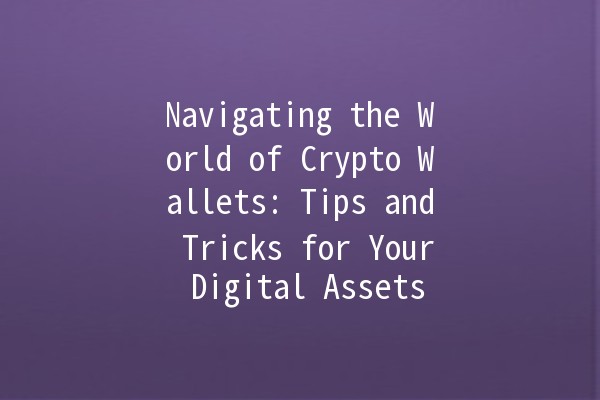
In the everevolving landscape of cryptocurrencies, understanding how to securely manage your digital assets is crucial. Crypto wallets serve as the gateway to your digital funds, providing safety and ease of access. This article delves deep into the various types of crypto wallets, offers productivityenhancing techniques, and helps you choose the right wallet for your needs while ensuring your investments remain secure.
Understanding Crypto Wallets
A crypto wallet is a software program or physical device that allows you to store, send, and receive cryptocurrencies. Unlike traditional wallets, cryptocurrency wallets do not store the actual currency; instead, they hold the private keys needed to access your public address on the blockchain.
Types of Crypto Wallets
There are three main types of crypto wallets:

How to Choose a Crypto Wallet
Selecting the right wallet can be overwhelming due to the vast options available. Here are a few tips:
Security Features: Look for wallets with twofactor authentication and backup options.
User Interface: Choose a wallet with intuitive navigation to help streamline your transactions.
Supported Cryptocurrencies: Ensure the wallet supports the assets you intend to hold.
Productivity Tips for Using Crypto Wallets
Managing cryptocurrencies can seem daunting, but applying specific productivity techniques can enhance your experience. Here are five actionable tips for effective crypto wallet management:
Explanation: A portfolio tracker allows you to monitor your cryptocurrency holdings in realtime.
Application: By using an app or software like Blockfolio, you can set alerts for price fluctuations and view the performance of your investments at a glance. Always ensure that your portfolio tracker is compatible with your wallet to maintain synchronization.
Explanation: Regular backups are essential for protecting your keys and wallet information.
Application: Schedule monthly reminders to back up your wallet data. Use encrypted cloud storage or an external hard drive. Make sure you have access to your recovery phrases in case of loss.
Explanation: Staying informed about market trends and news can directly influence your investment decisions.
Application: Subscribe to reliable crypto news outlets or set up Google Alerts for specific cryptocurrency topics. This enables you to react promptly to market changes, potentially capitalizing on profitable situations.
Explanation: Strong passwords and twofactor authentication (2FA) are your first line of defense against unauthorized access.
Application: Create complex passwords incorporating numbers, symbols, and both uppercase and lowercase letters. Use 2FA apps like Authy or Google Authenticator for an additional layer of security.
Explanation: Regularly reviewing your investment strategy can enhance your financial security.
Application: Set aside time each month to examine your investment landscape. Decide if you need to rebalance your portfolio, buy, or sell different assets based on your findings.
Common Questions About Crypto Wallets
The security of a crypto wallet largely depends on how it is used. Cold wallets, such as hardware wallets, are considered the most secure option as they keep your private keys offline. However, they also require more diligence when accessing your funds.
Yes, losing your wallet can lead to losing access to your cryptocurrencies if you do not have backup measures in place. Always create secure backups of your wallet data and private keys to mitigate this risk.
Not all wallets support all cryptocurrencies. It is crucial to research and select a wallet that includes your specific cryptocurrencies. Some wallets are designed for specific coins, while others support a broad range of digital currencies.
To prevent hacking, ensure you use reputable wallets with robust security measures, enable twofactor authentication, and avoid sharing sensitive information online. Also, consider using cold wallets for longterm storage.
While exchanges offer convenience, they are a potential target for hackers and may not be the safest option for longterm storage of your assets. It is advised to move your cryptocurrencies to a secure wallet if you are not actively trading.
If you forget your wallet password, try to use any recovery options provided by your wallet service. Many wallets allow you to reset your password using recovery phrases or backup methods. Without these recovery options, regaining access may not be possible.
Best Practices for Managing Your Crypto Wallet
To optimize your experience with crypto wallets:
Stay organized: Keep all your wallet information, recovery phrases, and passwords in a secure and accessible place.
Educate yourself continually: Engage with the crypto community and attend webinars to stay abreast of new developments.
Use multiple wallets: Diversifying your storage solutions can enhance security. For example, keep larger amounts in cold storage and maintain a hot wallet for daily transactions.
By following these guidelines, you can efficiently manage your crypto wallet, leverage productivityenhancing techniques, and protect your digital assets effectively. Understanding the crypto wallet environment enables you to make informed decisions today and in the future, ultimately leading to a more secure and productive investment journey.

